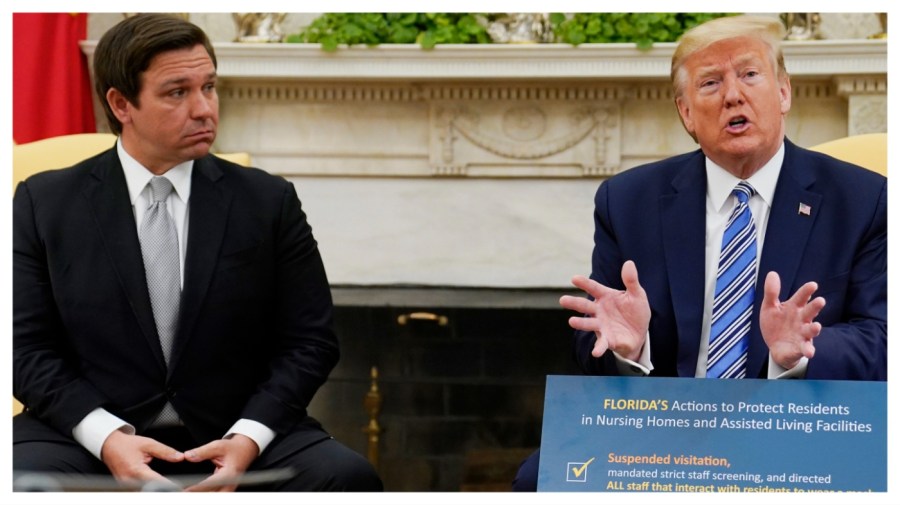
Florida Gov. Ron DeSantis (R) is taking steps to rebuild his ties with President-elect Trump after a bitter primary rivalry drew a wedge between the two former allies.
Trump and DeSantis met over golf in West Palm Beach, Fla., on Tuesday as the governor mulls a replacement for Trump’s secretary of State pick Marco Rubio (R-Fla.) in the Senate. And on Monday, DeSantis made a notable overture to Trump by calling for a special state legislative session to implement the incoming president’s immigration agenda.
This week’s events mark a sea change from where the governor and president-elect’s relationship was a year ago, and it suggests the Florida governor sees a close alliance with Trump as the best path forward as he weighs his political future.
“The relationship has definitely warmed back up and I think both of them realize they’re better off together and having a relationship and can bolster their agendas when they’re aligned,” said a source familiar with the conversations between Trump and DeSantis.
This week, DeSantis has notably leaned into immigration, arguably Trump’s top priority, in an effort to present himself as a loyal foot soldier to Trump before he takes office.
On Wednesday, DeSantis unveiled his priorities for addressing immigration in a special session during a press conference in central Florida. The plans for the special session included appointing a state liaison that would work with the federal government to enforce Trump’s immigration agenda.
DeSantis also called on local and state law officers to have “maximum participation” in enforcing federal laws and said he believed the federal government would “bless” state and local officials being empowered to detain and deport individuals in the state illegally. Additionally, the governor said he would push for better gang enforcement, reforms to education and voting, and require voter regression affirmation of U.S. citizenship and Florida residency.
“We have a new sheriff coming in town nationally,” DeSantis told reporters Wednesday. “As Florida leads working with the feds, other states will follow suit and we will create a healthy competition to get things done.”
The governor noted he has been in contact with Trump and his transition team over plans for the special session. DeSantis also expressed his desire for Florida to become an example for other states in enforcing Trump’s immigration agenda.
“This was a well coordinated plan,” the source familiar with the conversations said, noting talks over the plan have been taking place over the past two to three weeks.
“The big problem is the president doesn’t have funding to start arresting and deporting illegal immigrants in the United States,” the source said. “The governors do have money and a police force to be able to do that. So the governor wanted to help the president by taking the lead and then of course the president magnified that message by saying ‘way to go Ron, I hope other governors follow suit.”
Republicans say the move will reap political benefits for DeSantis, who is term-limited and will leave office in early 2027.
“The better DeSantis complies with the MAGA agenda, the better his future political prospects will be,” said Florida Republican strategist Ford O’Connell.
DeSantis and Trump have taken a number of steps to repair their working relationship following the presidential primary.
The governor endorsed Trump after dropping out of the race ahead of the New Hampshire primary and later pledged to aid Trump in the general election. The governor also received a speaking slot at the Republican National Convention in July. And in September, following the second assassination attempt against Trump at his West Palm Beach golf course, the governor announced the state was opening a criminal investigation into the matter.
There was even a period late last year when Trump was considering DeSantis as a potential Defense secretary pick in the case current nominee Pete Hegseth’s nomination tanked.
Even though it’s unclear what DeSantis’s move will be following the midterms, he also has the power to significantly impact Florida’s political environment for years to come.
The governor is mulling who will replace Rubio in the Senate, a decision he has said is likely to come around the time of Trump’s inauguration. A number of names have been floated for the position, including Florida Attorney General Ashley Moody (R); Lt. Gov. Jeanette Nuñez (R); and the governor’s chief of staff James Uthmeier. DeSantis said Monday he also has spoken to House lawmakers, including Florida Reps. Kat Cammack (R) and Cory Mills (R). However, he has expressed concerns about the GOP’s razor-thin majority in the House.
“Because he’s a former House member, he understands what a freaking problem this is,” said one Florida GOP strategist. “If he can find a way to speed up his special elections or New York can find a way to speed up their special elections this wouldn’t be an issue.”
But sources say most signs point to DeSantis choosing Moody for the spot. If that scenario were to play out, Uthmeier could be tapped to fill Moody’s post as the state’s attorney general.
“I think what he’s doing is he’s vetting who will be best for Florida in his eyes and frankly the fact that he’s looking at Moody, even Mills or Cammack, is a good sign that he’s saying ‘you know what I’m trying to do what is in Florida’s best future interests,'” the strategist said.
It’s unclear if whoever DeSantis appoints for the seat will run for it again in 2026, but it’s a possibility. Mills said last week “you can probably guarantee my hat is going to be thrown in the ring for 2026.”
“This is a once in a lifetime opportunity because usually Floridians who win Senate seats stay for a while,” the strategist said.












